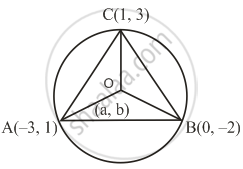Advertisements
Advertisements
प्रश्न
Find the coordinates of the circumcentre of a triangle whose vertices are (–3, 1), (0, –2) and (1, 3).
उत्तर

Let A(−3, 1), B(0, −2), C(1, 3) and the circumference O(a, b).
The distance of point O will be equal from A, B and C.
OA = OC ...(Radii of the same circle)
∴ `sqrt([a - (-3)]^2 + (b - 1)^2) = sqrt((a - 1)^2 + (b - 3)^2)` ...(Distance formula)
Squaring both the sides,
`(a + 3)^2 + (b - 1)^2 = (a - 1)^2 + (b - 3)^2`
`∴ cancela^2 + 6a +cancel9 + cancelb^2 − 2b + cancel1 = cancela^2 − 2a + cancel1 + cancelb^2 − 6b + cancel9`
∴ 6a − 2b = −2a − 6b
∴ 6a + 2a = − 6b + 2b
∴ 8a = −4b
∴ 8a + 4b = 0
∴ 4(2a + b) = 0
∴ 2a + b = 0 ....(I)
OB = OC ...(Radii of the same circle)
∴ `sqrt((a - 0)^2 + [b - (- 2)]^2) = sqrt((a - 1)^2 + (b - 3)^2)` ...(Distance formula)
Squaring both the sides,
`(a - 0)^2 + (b + 2)^2 = (a - 1)^2 + (b - 3)^2`
`∴ cancela^2 + cancelb^2 + 4b + 4 = cancela^2 − 2a + 1 + cancelb^2 − 6b + 9`
∴ 4b + 4 = − 2a − 6b + 10
∴ 4b + 2a + 6b = 10 - 4
∴ 2a + 10b = 6 ...(II)
Subtracting I from II, we get,
\[\begin{array}{1}
\phantom{\texttt{}}\texttt{2a + b = 0}\\ \phantom{\texttt{}}\texttt{- 2a + 10b = 6}\\ \hline\phantom{\texttt{}}\texttt{(-) (-) (-)}\\ \hline \end{array}\]
∴ - 9b = - 6
∴ b = `(-6)/(-9)`
∴ b = `2/3`
Substituting b = `2/3` in equation I, we get,
∴ 2a + b = 0
∴ 2a + `2/3` = 0
∴ 2a = `-2/3`
∴ a = `-2/3 xx 1/2`
∴ a = `(-1)/3`
Coordinates of the circumcentre are `((-1)/3, 2/3)`.
संबंधित प्रश्न
A line intersects the y-axis and x-axis at the points P and Q respectively. If (2, –5) is the mid-point of PQ, then find the coordinates of P and Q.
Find the coordinates of the circumcentre of the triangle whose vertices are (3, 0), (-1, -6) and (4, -1). Also, find its circumradius.
Name the quadrilateral formed, if any, by the following points, and given reasons for your answers:
A(4, 5) B(7, 6), C (4, 3), D(1, 2)
Prove that the points (4, 5) (7, 6), (6, 3) (3, 2) are the vertices of a parallelogram. Is it a rectangle.
Find the coordinates of the points of trisection of the line segment joining the points (3, –2) and (–3, –4) ?
The abscissa of any point on y-axis is
If (0, −3) and (0, 3) are the two vertices of an equilateral triangle, find the coordinates of its third vertex.
If (a,b) is the mid-point of the line segment joining the points A (10, - 6) , B (k,4) and a - 2b = 18 , find the value of k and the distance AB.
Write the ratio in which the line segment doining the points A (3, −6), and B (5, 3) is divided by X-axis.
If the points A (1,2) , O (0,0) and C (a,b) are collinear , then find a : b.
The distance between the points (a cos 25°, 0) and (0, a cos 65°) is
If the centroid of a triangle is (1, 4) and two of its vertices are (4, −3) and (−9, 7), then the area of the triangle is
The length of a line segment joining A (2, −3) and B is 10 units. If the abscissa of B is 10 units, then its ordinates can be
Students of a school are standing in rows and columns in their playground for a drill practice. A, B, C and D are the positions of four students as shown in figure. Is it possible to place Jaspal in the drill in such a way that he is equidistant from each of the four students A, B, C and D? If so, what should be his position?
If y-coordinate of a point is zero, then this point always lies ______.
Which of the points P(0, 3), Q(1, 0), R(0, –1), S(–5, 0), T(1, 2) do not lie on the x-axis?
If the vertices of a parallelogram PQRS taken in order are P(3, 4), Q(–2, 3) and R(–3, –2), then the coordinates of its fourth vertex S are ______.
The distance of the point (–1, 7) from x-axis is ______.
The distance of the point (3, 5) from x-axis (in units) is ______.
Assertion (A): The point (0, 4) lies on y-axis.
Reason (R): The x-coordinate of a point on y-axis is zero.
